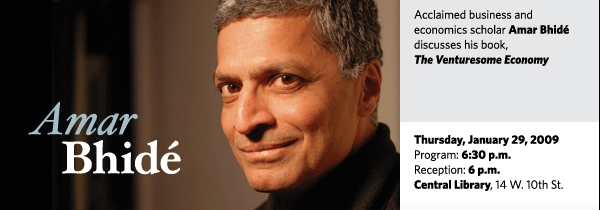All Library locations will be closed Monday, January 19 for Martin Luther King, Jr. Birthday.
Many observers contend that the off-shoring of research and development to China and India threatens the foundations of Western prosperity. But acclaimed business and economics scholar Amar Bhidé asserts the doomsayers are wrong. Author of The Venturesome Economy: How Innovation Sustains Prosperity in a More Connected World, Bhidé presents his thesis on Thursday, January 29, at 6:30 p.m. at the Central Library, 14 W. 10th St.
Using extensive field studies on venture-capital-backed businesses to examine how technology really advances in modern economies, Bhidé explains why know-how developed abroad enhances – not diminishes – prosperity at home, and why trying to maintain the U.S. lead by subsidizing more high-level research or training more scientists will do more harm than good.
Many players – entrepreneurs, managers, financiers, salespersons, consumers, and not just a few brilliant scientists and engineers – have kept the United States at the forefront of the innovation game. As long as their venturesome spirit remains alive and well, Bhidé argues, advances abroad need not be feared.
Amar Bhidé is the Glaubinger Professor of Business at Columbia University, editor of Capitalism and Society, member of the Council on Foreign Relations, and the author of The Origin and Evolution of New Businesses. A former McKinsey & Company consultant, Bhidé was educated at the Indian Institute of Technology and Harvard Business School, where he graduated as a Baker Scholar and later served as an associate professor.
His presentation is sponsored by the Ewing Marion Kauffman Foundation. Bhidé’s book will be available for sale and the author will sign copies purchased during the event.
